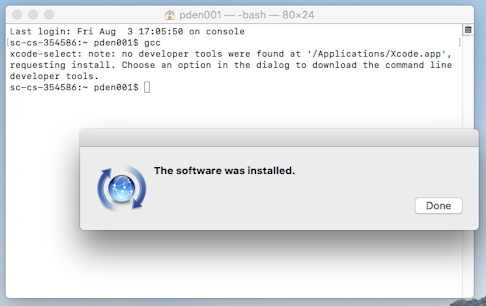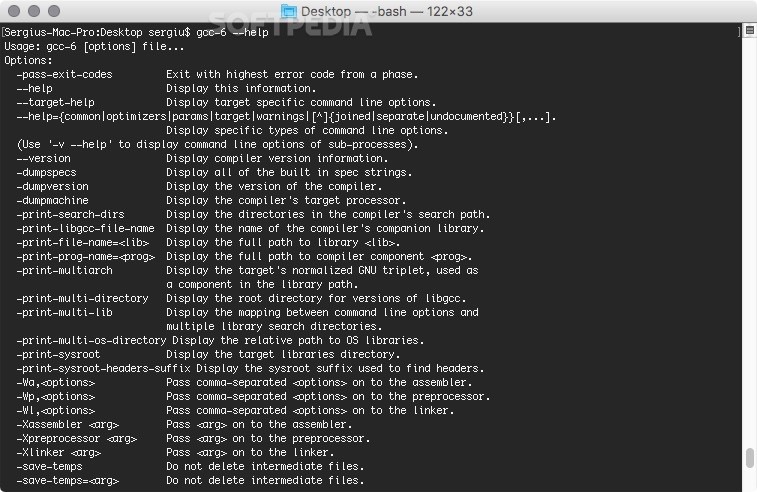Posted on October 12, 2019 by Paul
Updated 8 May 2020

In this tutorial, I will show you how to compile from source and install the current stable version of GCC on your macOS computer. The instructions from this tutorial were tested on Catalina (macOS 10.15).
Clang, the default compiler for macOS, supports only C, C++, Objective-C and Objective-C++. If you are interested in a modern Fortran compiler, e.g. you will need gfortran that comes with GCC. Another reason to have the latest stable version of GCC on your macOS is that it provides you with an alternative C and C++ compiler. Testing your code with two different compilers is always a good idea.
Installing G on a Mac. This section is intended to get you quickly started with C programming on your Mac. We'll be installing GCC 4.8.1 and GDB through a tool called Homebrew. If you want an additional guide on all of the following steps (except for installing GCC), the one by Moncef Belyamani is quite helpful. When you follow it, ignore. This is a guide for installing GCC 5.1 on a Mac using MacPorts. It will likely work for later versions of GCC as well. Just substitute 'gccx' for 'gcc5', where 'x' is the desired version. Download and install Xcode from the Mac App Store. Download and install the MacPorts 'pkg' installer appropriate for your OS version (e.g., Mavericks is 10.9. Start the App Store application on your Mac computer. Apple logo - App Store. In the App Store, search for TextWrangler and select it from the search list. Press the Get button and wait for the installation to complete. In the App Store, press the Open button. In TextWrangler, open the Preferences dialog. TextWrangler Preferences Text Files. Jul 23, 2020 GCC 10 Release Series. The GNU project and the GCC developers are pleased to announce the release of GCC 10.1. This release is a bug-fix release, containing fixes for regressions in GCC 10.1 relative to previous releases of GCC.
Building GCC 10 from sources could take some time, in my case it took about two hours on a MacBook Air with a 16GB of RAM.
In order to compile GCC from sources you will need a working C++ compiler. In the remaining of this article I will assume that you have installed the Command Line Tools for Xcode. At the time of this writing Apple’s Command Line Tools maps the gcc and g++ to clang and clang++. If you don’t have the Command Line Tools installed, open a Terminal and write:
which will guide you through the installation process.

Let’s start by creating a working folder:
Next, we can download and extract the latest stable version of GCC:
GCC 10 depends on a couple of other libraries (GSL, GMP, MPFR and ISL) that can be downloaded with:
the above four prerequisites will be built during the GCC build.
We are ready to compile GCC now. Be prepared that this could take some time … Since I’m interested only in the C, C++ and Fortran compilers, this is the configure command I’ve used on my machine:
The above command instructs the configure app to add a prefix to all the resulting executable programs, so for example if you want to invoke GCC 10.1.0 you will write gcc-10.1, the gcc command will invoke Apple’s version of clang.
If you are interested in building more compilers available in the GCC collection modify the –enable-languages configure option.
And now, the final touches:
Grab a coffee, maybe a book, and wait … this should take approximately, depending on your computer configuration, an hour … or more … and about 4.15GB of your disk space for the build folder.

Gcc Download Mac Software
Install the compiled gcc in /usr/local/gcc-10.1.0:
Now, you can keep the new compiler completely isolated from your Apple’s gcc compiler and, when you need to use it, just modify your path by writing in Terminal:
If you want to avoid writing the above command each time you open a Terminal, save the above command in the file .zshrc from your Home folder, e.g:
You should be able to invoke any of the newly built compilers C, C++, Fortran …, invoking g++ is as simple as writing in your Terminal:
Remember to erase the working folder from your HOME if you want to recover some space:
Next, I’ll show you how to check if the compiler was properly installed by compiling and running a few examples. GCC 10 uses by default the C++14 standard and C11 for the C coders, you should be able to compile any valid C++14 code directly. In your favorite text editor, copy and save this test program (I’ll assume you will save the file in your Home directory):
Compiling and running the above lambda example:
We could also compile a C++ code that uses threads:
Next, we present a simple C++ code that uses regular expressions to check if the input read from stdin is a floating point number:
Download Gcc For Macos
If you are a Fortran programmer, you can use some of the Fortran 2008 features like doconcurrent with gfortran-10.1:
The above code can be compiled with (assuming you’ve saved it as tst_concurrent_do.f90):
If you are interested in learning more about the new C++11/C++14 syntax I would recommend reading The C++ Programming Language by Bjarne Stroustrup.
or, Professional C++ by M. Gregoire, N. A. Solter, S. J. Kleper 2nd edition:
If you need to brush your Fortran knowledge a good book is Modern Fortran Explained by M. Metcalf, J. Reid and M. Cohen: